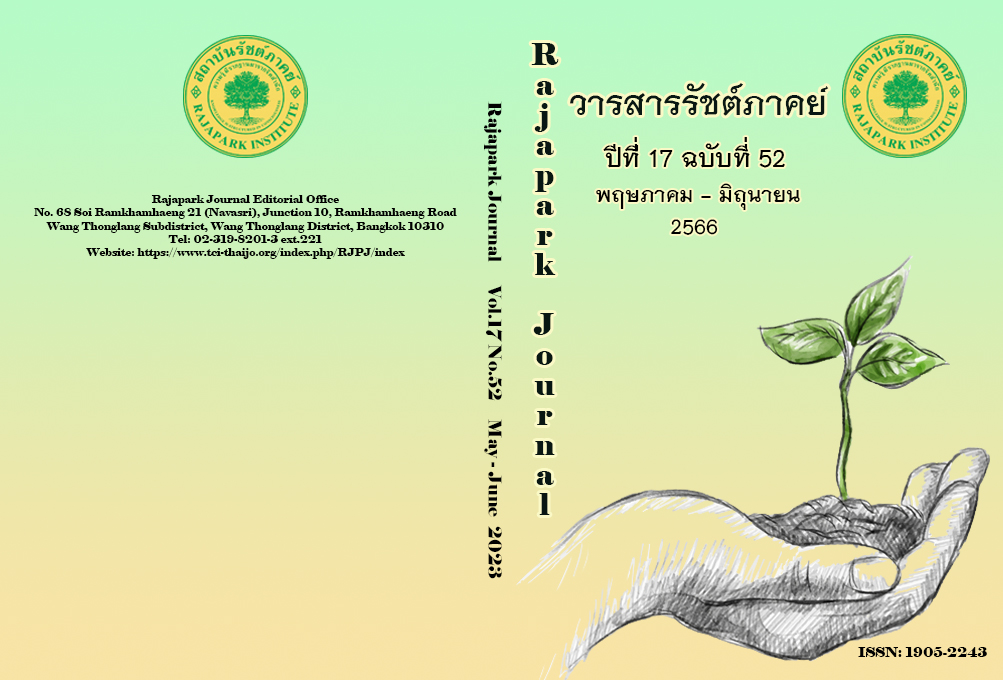The Development of Electronic Book to Improve Oral Reading and Spelling Ability in Thai Language Subject for Grade 2 Students at Naluang School
Main Article Content
Abstract
The objectives of this research were to 1) develop and determine the quality of E-book to Improve Oral Reading and Spelling for grade 2 students, 2) measure Thai oral reading and spelling skills of grade 2 students, 3) compare learning achievement on Oral Reading and Spelling for grade 2 students before and after study with the developed E-book, 4) study the satisfaction about the developed E-book of grade 2 students at Naluang School. The sample of this research consisted of 38 grade 2 students from one classroom at Naluang School under the supervision of Thung Khru District Office, Bangkok, which was obtained from a purposive sampling. Research instruments included the E-book on Oral Reading and Spelling in Thai language subject, quality assessment form for content and design, Oral Reading and Spelling skills test, learning achievement test and satisfaction assessment form. Data were analyzed using statistics to determine percentage, mean, standard deviation and t-test. The findings revealed that 1) the content quality of the E-book to Improve Oral Reading and Spelling was at a very good level and the design quality was also at a very good level. 2) The sample had a high level of Thai oral reading and spelling skills (97.37%) and a moderate level (2.63%). 3) Learning achievement on Oral Reading and Spelling of the sample at the posttest period was higher than that at the pretest period with a statistical significance level of .05. 4) The sample’s satisfaction was at a high level.
Article Details

This work is licensed under a Creative Commons Attribution-NonCommercial-NoDerivatives 4.0 International License.
Views and opinions appearing in the Journal it is the responsibility of the author of the article, and does not constitute the view and responsibility of the editorial team.
References
Boonrueng, S. (2013). The Development of Electronic Books on Reading for Main Idea of Prathomsuksa 4 Students, Wat Donwai (Nakhonrattaprasart) School[Master’s Thesis, Silpakorn University].
Bureau of Academic Affairs and Educational Standards. (2016). Handbook of Teaching Reading and Writing by Distributing Spelling Children. http://academic.obec.go.th/web/document/view/166
Bureau of Academic Affairs and Educational Standards. (2017). Core Curriculum B.E. 2551. Learning Standard and Indicator Thai Language. Office of the Basic Education Commission, Ministry of Education. http://www.obec.go.th/
Chanchai, S. (2014). Design and Development of Teaching and Learning. Petchkasem.
Jaritnom, A. (2010). The Development of Electronic Books for Thai Learning Strand on the Topic of “Word Formation” for Mattayomsuksa 1[Master’s Thesis, Rajabhat Mahasarakham University].
Ministry of Education. (2015). No Students Can’t Read and Write. https://www.moe.go.th/
Ministry of Education. (2017). Basic Education Core Curriculum B. E. 2551 (A.D. 2008) and Learning Standards and Indicators (Revised Edition B.E. 2560). http://academic.obec.go.th/web/mission/view/34
Ministry of Education. (2020). National Education Act B.E. 2542 (1999) (Update). https://www.moe.go.th/
Noiumkar, S. (2018). Interactive E-Book Model. Journal of Humanities and Social Sciences Mahasarakham University, 37(2), 182-193.
Office of the Basic Education Commission, Ministry of Education. (2008). Importance of Reading in Elementary School Students. Chamchuri Products.
Office of the Education Council, Ministry of Education. (2010). The National Education Act B.E. 2542 (1999), the Amendments (Second National Education Act) B.E. 2545 (2002) and the Amendments (Third National Education Act) B.E. 2553 (2010). http://www.onec.go.th/
Office of the Education Council, Ministry of Education. (2017). The National Scheme of Education B.E. 2560-2579 (2017-2036). http://www.onec.go.th/
Sakolrak, S. et al. (2017). A Comparative Study of Teaching Thai Literacy Models, Methods and Achievement at the Elementary Education Level in the Reign of King RAMA IX. Journal of Research Methodology, 30(2), 303-327.
Sattanan, S. (2009). Effects of Using a Thai Language Electronic Book on Learning Achievement and Attitude toward Learning of Prathom Suksa V students at Ban Thung Sawang School in Buriram Province[Master’s Thesis, Sukhothai Thammathirat Open University].
Somjaiwang, T. (2015). Development Electronic Books on the Tablet Knowledge to ASEAN Learning about Social Studies Religion and Culture for Prathom 2 Students[Master’s Thesis, Silpakorn University].
Srinak, S. (2009). The Learning Achievement and The Satisfaction with Learning by Electronic Books for Promotion of Reading on The Topic of Sufficiency Economy for Students of Primary Grade 4[Master’s Thesis, Thaksin University].
Weerasakul, C. (2013). Development of Electronic Book on Reading and Writing with Irregular Spelling Word for Prathomsuksa 3 Students[Master’s Thesis, Bhurapa University].


